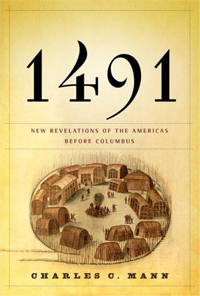1491: New Revelations of the Americas Before Columbus by Charles C. Mann caught my eye in the library. It promised new revelations, and I did learn a lot, though I didn't retain all the names and dates I was probably intended to. I thought at times it moved a little slowly, but that may be because I was taking breaks and reading other things at the same time.
It's more interesting than that sounds, I promise. Mann is an engaging writer, and he goes between reconstructions of ancient world politics, archaeological excavations, and his own personal explorations smoothly to create a varied and interesting narrative. He explained some widely-held misconceptions about the pre-Columbian Americas and showed us how they're probably wrong, but not in a snobby, scholarly way. He takes us on a voyage of discovery. He quotes dozens and dozens of experts, and it looks like he's done his homework.
Well... most of it. Probably all the important homework. But I did catch one detail that made his credibility slip in my mind. In chapter 5, he explains one very old (and now discounted) theory that Native Americans were actually the lost tribes of Israel:
... at that time, according to scripture, the Hebrew tribes had split into two adjacent confederations, the northern kingdom of Judah, with its capital Jerusalem, and the southern kingdom of Israel, with its capital in Samaria. After the southern tribes took to behaving sinfully, divine retribution came in the form of Shalmaezer V.... now repenting of their wickedness, the Bible explains, the tribes resolved to "go to a distant land never yet inhabited by man, and there at last be obedient to their laws."Having read the Bible before (even took a Hebrew prophets class!), I noticed he had it mixed up: Israel was the northern kingdom, Judah the southern.
Is this terribly relevant to the rest of the book? Probably not. It was one tiny detail, and maybe even an accident. However, as my writing professor has often repeated, one tiny detail wrong can cast doubt on all the rest of your work. It's a pretty simple one, too. I wonder that editors didn't catch it. They're supposed to have people check these sorts of things (or he could have done a Google image search. Or something.).
This error belies the 100-some pages of bibliography, notes, and appendices, however. You be the judge.
I read this book because I like to learn. Aside from just facts and accounts, it gave me a look into the worlds of archaeology and anthropology and the fierce, still ongoing debates about what we've learned really means. It fleshed out a culture that for me still looked like the Indians I learned about in elementary school. Now, I don't imagine pictures -- I imagine people. Living, breathing cultures, rooted in humanity just as much as they are in the mysteries of the past. It was eye-opening. I guess nonfiction will do that for you.

No comments:
Post a Comment